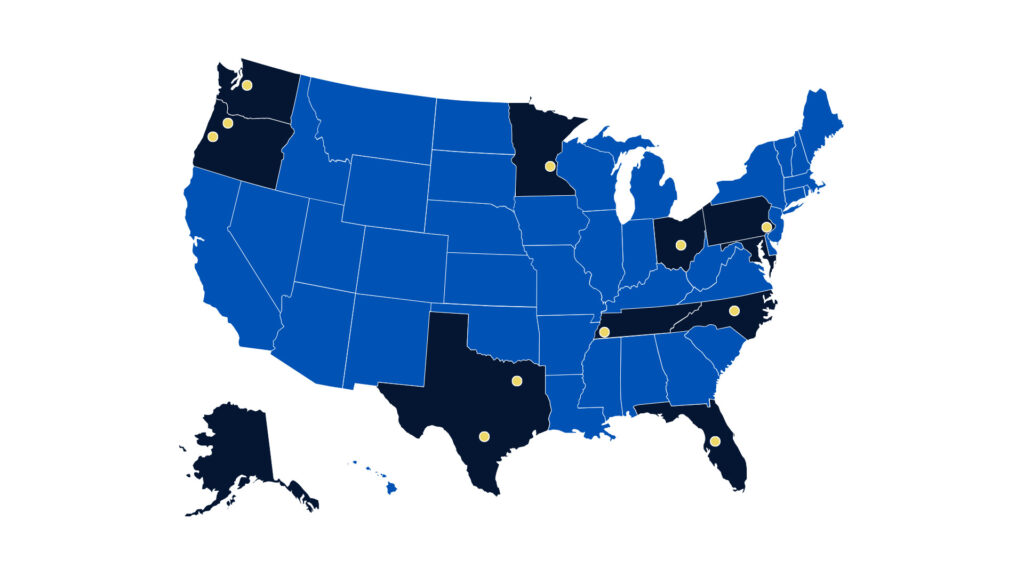A National Network of Workforce Leaders
Interested in a free professional development opportunity and access to a network of hundreds of other workforce development professionals? RFA’s State and Local Workforce Fellowship works with data- and evidence-driven state and local government leaders to make tangible progress in improving workforce outcomes. The State and Local Workforce Fellowship offers workforce leaders the opportunity to:
- Expand their professional network
- Gain new skills through trainings and resources and
- Catalyze projects in their jurisdictions through direct technical assistance.

The map above shows current states and localities participating
in our State and Local Workforce Fellowship.
Join our email list
Our Focus
RFA has worked with 85+ jurisdictions across the U.S. since 2019 to refine workforce initiatives through action-oriented technical assistance. Through our fellowship, participants access:
- Practical resources including templates and best practices to sustain impact beyond the Fellowship
- Professional development through expert trainings and in-person conferences
- Peer support through our national network of workforce professionals, during and after participation
Learning Tracks
By equipping leaders with knowledge and tools, our fellows implement evidence-driven strategies that strengthen workforce investments or advance job quality.
- Job Quality: Fellows enrolled in the Advancing Job Quality content track will leave with a framework that defines job quality for their jurisdiction and employs evidence-based interventions, ensuring workforce programming invests in programs, partners, and businesses that have or lead to high quality jobs and launch that framework via a specific project, policy, or practice.
- Procurement and Spending: Fellows enrolled in the Evidence-Based Workforce Spending content track will leave with a revised RFP/NOFO that uses evidence- and outcomes-based grantmaking, contracting, and budgeting strategies to inform funding goals, define performance metrics, develop an evidence framework, link funding to outcomes, and/or actively manage procurements through the funding lifecycle.
What Our Fellows Say
“Our state is on the right track! We are putting together a Job Quality framework for the state.”
2024 Fellow, State of Washington
“I’m really glad that there’s a quality jobs playbook for us to lean on. Grateful for the 1:1 time as well! I understand procurement now!”
2024 Fellow, Oregon County-Level Agency
“It was really great to learn the formal structure of creating evidence based procurements and how that is done across different states.”
2024 Fellow, New York City
“It’s great to have technical assistance available to states and to have organizations like RFA to facilitate and make connections.”
2024 Fellow, State of Connecticut
What to Expect From the Fellowship

Training delivered by subject matter experts develop Fellows’ the skills and knowledge to implement evidence-based strategies. Examples from past trainings include defining and prioritizing evidence in grants and contracts, active contract/grant management, outcomes-based contracting, job quality and equity measurement and improvement, and evaluation and evidence-building.
 Workforce-specific technical assistance and strategy support help Fellows identify, scope, and make tangible progress on a specific workforce challenge. TA can take the form of capacity and skill building, research and resource provision, directed feedback and review, etc.
Workforce-specific technical assistance and strategy support help Fellows identify, scope, and make tangible progress on a specific workforce challenge. TA can take the form of capacity and skill building, research and resource provision, directed feedback and review, etc.
 A peer network of top government innovators from around the country, offering Fellows new ideas and approaches and providing direction and motivation when challenges inevitably arise.
A peer network of top government innovators from around the country, offering Fellows new ideas and approaches and providing direction and motivation when challenges inevitably arise.
 Access to action-oriented tools such as sample RFPs, legislative language, toolkits, and strategies for Fellows leading organizational change.
Access to action-oriented tools such as sample RFPs, legislative language, toolkits, and strategies for Fellows leading organizational change.
 Spotlighting and celebrating Fellows’ successes to drive public and political support and build demand among a broader group of workforce development decision-makers, through articles, speaking opportunities, op-eds, Congressional staff briefings, meetings with U.S. Department of Labor officials, and public events.
Spotlighting and celebrating Fellows’ successes to drive public and political support and build demand among a broader group of workforce development decision-makers, through articles, speaking opportunities, op-eds, Congressional staff briefings, meetings with U.S. Department of Labor officials, and public events.